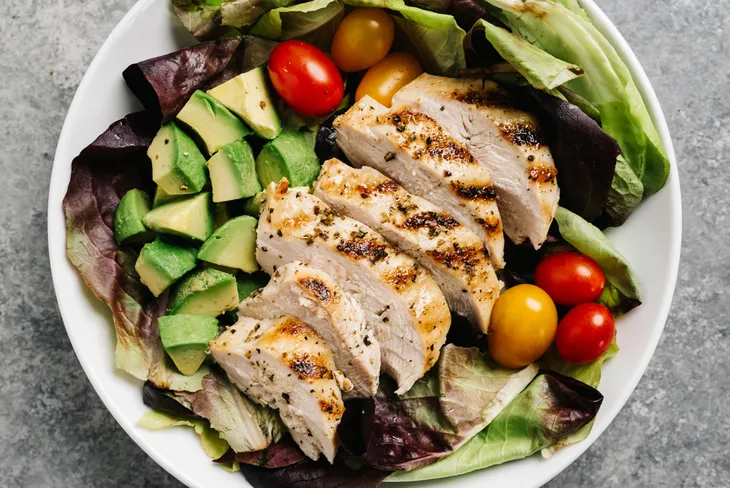Between the ages of 20 and 55, most adults gain between 0.5 and 1kg a year, which could see some people become overweight or obese over time. This weight gain isn’t usually the result of overeating large amounts of food. Instead, it’s usually caused by eating a small amount – around 100-200 extra calories – more than is needed each day.
The good news is that we may be able to prevent ourselves from gaining weight by making small changes to our diet or physical activity. Our recent review found that eating 100-200 calories less, or burning an extra 100-200 calories each day, may be enough to stop ourselves from gaining weight in the long run. This is known as a “small-changes approach”, which was first proposed in 2004 by James Hill, an American expert on obesity, to help people manage their weight.
Many small studies have investigated the use of the small-changes approach for weight management. We combined the results of these smaller studies into a larger review to get an average (and more statistically reliable) result of the effect of this approach on weight management. We looked at 19 trials – 15 of which tested a small-changes approach to prevent weight gain, and four that test this approach for weight loss.
We analysed the data of nearly 3,000 people in weight-gain prevention trials, and 372 people in weight-loss trials. Participants were aged between 18 and 60, 65% of whom were female. In those who used the small-changes approach to prevent weight gain, we found that participants gained almost 1kg less compared with those who didn’t use this approach over a period of eight to 14 months. The 1kg difference was statistically significant, meaning it was unlikely to be the result of chance.
While the small-changes approach was shown to be effective for preventing weight gain, it was not proven to be effective for weight loss.
Preventing weight gain
The trials we looked at used a number of different small changes to help participants prevent weight gain. Here are some of the successful techniques used in these trials:
- Get off the bus one stop earlier and walk the rest of the way. You may end up walking ten to 15 minutes more and this could help you burn up to 60 calories. Doing this on the way home as well could mean you burn up to 120 calories.
- Skip the chips that come as a side. Small portions of oven chips served alongside main meals contain hundreds of calories . Saying no to these – or opting for a salad or vegetables as a side instead – could help you reduce your daily calorie intake by up to 200 calories.
- Switch from a regular to a diet drink. Although it might not taste the same, making this switch could reduce your calorie intake by 145 calories. However, recent research suggests that switching to diet drinks may not be great for weight management – so choosing to drink water instead of your regular fizzy drink might be best.
- Have an Americano instead of a latte. The milk in a regular latte can contain up to 186 calories, so switching to an Americano could prevent weight gain.
- Add one less tablespoon of oil while cooking. One tablespoon of olive oil, for example, contains slightly over 100 calories, so using less can be one way of avoiding additional calories.
- If you have something sweet, save half of it for tomorrow. Eating only half a KitKat, for example, could reduce your calorie intake by about 102 calories – and give you something to look forward to tomorrow.
- Take one or two fewer potatoes in your roast dinner. One medium roast potato can contain as many as 200 calories, so be mindful of how many you put on your plate.
- Take phone meetings while walking. You could burn an extra 100 calories if you opted to take a 30-minute phone call on the go.
- Avoid sweets. Saying no to cakes, biscuits and other sweets could help you easily cut an extra 100-200 calories from your diet – maybe more, depending on the food.
- Take your dog for an extra 30-minute brisk walk each day. The dog will appreciate it, and you could burn over 150 calories.
The small-changes approach has many advantages for managing weight. First, small changes are easier to incorporate into everyday life over larger ones. For example, it’s easier to eat 100-200 fewer calories a day than to eat 500 fewer calories each day (basically, an entire meal). Small changes are also easier to maintain in the long run, which is key to managing weight. And, if people succeed at making these small changes, it may lead them to make bigger changes in their life.
![]() Claire Madigan, Senior Research Associate, Centre for Lifestyle Medicine and Behaviour, Loughborough University and Henrietta Graham, PhD Researcher, Sport, Exercise and Health Sciences, Loughborough University
Claire Madigan, Senior Research Associate, Centre for Lifestyle Medicine and Behaviour, Loughborough University and Henrietta Graham, PhD Researcher, Sport, Exercise and Health Sciences, Loughborough University
This article is republished from The Conversation under a Creative Commons license. Read the original article.





